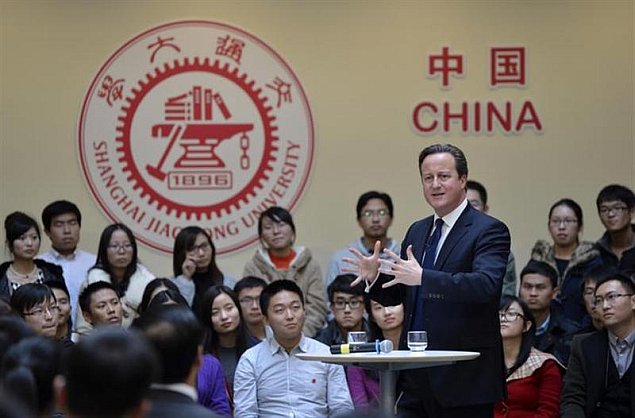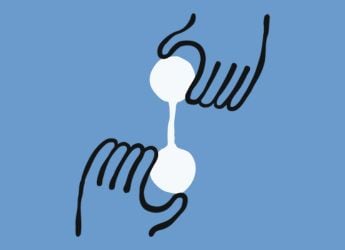- Home
- Internet
- Internet News
- Britain must boost its oversight of Huawei cyber security centre: Cameron
Britain must boost its oversight of Huawei cyber-security centre: Cameron
By Agence France-Presse | Updated: 18 December 2013 19:30 IST

Click Here to Add Gadgets360 As A Trusted Source

Advertisement
Britain must boost its oversight of a cyber-security centre run by Chinese telecoms giant Huawei, Prime Minister David Cameron said Tuesday, after lawmakers raised fears that the company's involvement could pose a threat to national security.
Cameron said British electronic eavesdropping agency GCHQ would now play a greater role in hiring key staff at the Huawei Cyber Security Evaluation Centre (HCSEC) in Oxfordshire, southern England, which the Chinese firm opened in 2010.
Huawei has been barred from involvement in broadband projects in the United States and Australia over espionage fears.
In July, the British parliament's Intelligence and Security Committee (ISC) published a report warning that the government had insufficient oversight of the centre, which is known as "the Cell", and urging Britain's national security adviser Kim Darroch to investigate its operations "as a matter of urgency".
Lawmakers had expressed concerns about alleged close links between Huawei and the Chinese state -- which the company denies -- and raised fears that China could exploit weaknesses in Huawei's equipment to spy on Britain.
Huawei supplies equipment to major British telecoms companies including BT, and channels phone calls and data around the country.
Cameron said Tuesday that the government had heeded Darroch's recommendation that British spies should play a greater role in hiring the centre's top staff, and said oversight of the centre in general would be tightened.
"The government's main conclusion, which reflects discussion with the chairman of the ISC, is that oversight of HCSEC should be enhanced, and that GCHQ should take a leading and directing role in its future senior appointments," Cameron said in a statement.
Huawei meanwhile said it welcomed Darroch's conclusion that the Chinese giant was "a model for government collaboration with the private sector".
"Huawei shares the same goal as the UK government and our customers in raising the standards of cyber security in the UK," a company spokeswoman said.
Darroch said in a summary of his review that he was satisfied that the centre operated with "sufficient independence" and that vulnerabilities identified in its systems "could be explained as genuine design weaknesses or errors in coding practice".
China has been accused of large-scale cyber espionage.
In a report released in February, the security firm Mandiant said China was devoting thousands of people to a military-linked unit that has pilfered intellectual property and government secrets.
China has cited leaks by former American intelligence contractor Edward Snowden -- revealing mass US electronic surveillance programmes -- as evidence that the United States is guilty of double standards when it comes to online espionage.
Cameron said British electronic eavesdropping agency GCHQ would now play a greater role in hiring key staff at the Huawei Cyber Security Evaluation Centre (HCSEC) in Oxfordshire, southern England, which the Chinese firm opened in 2010.
Huawei has been barred from involvement in broadband projects in the United States and Australia over espionage fears.
In July, the British parliament's Intelligence and Security Committee (ISC) published a report warning that the government had insufficient oversight of the centre, which is known as "the Cell", and urging Britain's national security adviser Kim Darroch to investigate its operations "as a matter of urgency".
Lawmakers had expressed concerns about alleged close links between Huawei and the Chinese state -- which the company denies -- and raised fears that China could exploit weaknesses in Huawei's equipment to spy on Britain.
Huawei supplies equipment to major British telecoms companies including BT, and channels phone calls and data around the country.
Cameron said Tuesday that the government had heeded Darroch's recommendation that British spies should play a greater role in hiring the centre's top staff, and said oversight of the centre in general would be tightened.
"The government's main conclusion, which reflects discussion with the chairman of the ISC, is that oversight of HCSEC should be enhanced, and that GCHQ should take a leading and directing role in its future senior appointments," Cameron said in a statement.
Huawei meanwhile said it welcomed Darroch's conclusion that the Chinese giant was "a model for government collaboration with the private sector".
"Huawei shares the same goal as the UK government and our customers in raising the standards of cyber security in the UK," a company spokeswoman said.
Darroch said in a summary of his review that he was satisfied that the centre operated with "sufficient independence" and that vulnerabilities identified in its systems "could be explained as genuine design weaknesses or errors in coding practice".
China has been accused of large-scale cyber espionage.
In a report released in February, the security firm Mandiant said China was devoting thousands of people to a military-linked unit that has pilfered intellectual property and government secrets.
China has cited leaks by former American intelligence contractor Edward Snowden -- revealing mass US electronic surveillance programmes -- as evidence that the United States is guilty of double standards when it comes to online espionage.
Comments
Get your daily dose of tech news, reviews, and insights, in under 80 characters on Gadgets 360 Turbo. Connect with fellow tech lovers on our Forum. Follow us on X, Facebook, WhatsApp, Threads and Google News for instant updates. Catch all the action on our YouTube channel.
Further reading:
Britain, British government, Cameron, China, David Cameron, England, GCHQ, HCSEC, Huawei, Huawei Cyber Security Evaluation Centre, ISC, Oxfordshire, UK, United Kingdom
Related Stories
Popular on Gadgets
- Samsung Galaxy Unpacked 2026
- iPhone 17 Pro Max
- ChatGPT
- iOS 26
- Laptop Under 50000
- Smartwatch Under 10000
- Apple Vision Pro
- Oneplus 12
- OnePlus Nord CE 3 Lite 5G
- iPhone 13
- Xiaomi 14 Pro
- Oppo Find N3
- Tecno Spark Go (2023)
- Realme V30
- Best Phones Under 25000
- Samsung Galaxy S24 Series
- Cryptocurrency
- iQoo 12
- Samsung Galaxy S24 Ultra
- Giottus
- Samsung Galaxy Z Flip 5
- Apple 'Scary Fast'
- Housefull 5
- GoPro Hero 12 Black Review
- Invincible Season 2
- JioGlass
- HD Ready TV
- Latest Mobile Phones
- Compare Phones
Latest Gadgets
- Lava Bold N2
- Vivo V60 Lite 4G
- Tecno Pova Curve 2 5G
- Lava Yuva Star 3
- Honor X6d
- OPPO K14x 5G
- Samsung Galaxy F70e 5G
- iQOO 15 Ultra
- Asus Vivobook 16 (M1605NAQ)
- Asus Vivobook 15 (2026)
- Brave Ark 2-in-1
- Black Shark Gaming Tablet
- boAt Chrome Iris
- HMD Watch P1
- Haier H5E Series
- Acerpure Nitro Z Series 100-inch QLED TV
- Asus ROG Ally
- Nintendo Switch Lite
- Haier 1.6 Ton 5 Star Inverter Split AC (HSU19G-MZAID5BN-INV)
- Haier 1.6 Ton 5 Star Inverter Split AC (HSU19G-MZAIM5BN-INV)
© Copyright Red Pixels Ventures Limited 2026. All rights reserved.







![[Partner Content] OPPO Reno15 Series: AI Portrait Camera, Popout and First Compact Reno](https://www.gadgets360.com/static/mobile/images/spacer.png)









